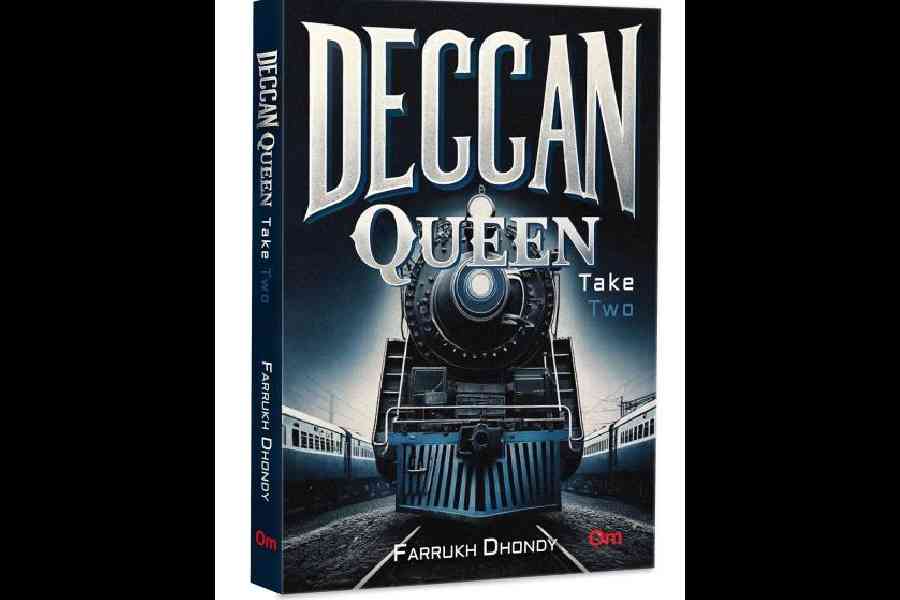Like an opulent Parsi wedding feast, from dhansak to patra ni machhi, the newest collection of stories in British-Indian celebrity writer Farrukh Dhondy’s Deccan Queen: Take Two offers a compelling tale for every reader’s taste. The title comes from his lived experience as a young Parsi boy on the train between Poona and Bombay, which went in the mornings and came back to Poona in the evenings. “It was, through my childhood, the gateway to a different city and a different dimension of mingling, a different pace of life and excitement, even in my fanciful juvenile mind, a link between peace and panic,” says Dhondy, a winner of the Whitbread Award.
There comes a time in the life of a writer, as Ernest Hemingway and Hart Crane — two of the most sensitised and sensitive writers of the twentieth century — argued, that looking back over your shoulder and looking ahead to the horizon encourage you to either stop the frenetic pace of creating or become even more prodigious and formidable to remember the past and continue to ferret out the still unexcavated jewels that remain embedded in the brain.
In the past year, Dhondy’s writing has reached a fever pitch. He declares unabashedly that of the several simultaneous initiatives that run almost on the same tracks as Deccan Queen is “my autobiography entitled Fragments Against My Ruin by Westland in India and Verso in the UK, and my book of childhood and family stories in sonnet form called Grannies, Groins and Growing Up by Red River Books, the dapper publisher that is supporting some innovative new poets.
Eminently equipped more by his keen interest in English literature than training — Dhondy read quantum physics in Cambridge — Deccan Queen, through its diverse style and content, and a smart blend of genres — epistolary or letter writing, fiction and verse — represents with veracity, refreshing conceptualisation and fluidity of language, how power manipulates and more often than not, brutally erases the very existence of free thought and action in those who are vulnerable and on the fringes.
Nuanced in his tellings, and honest in his depictions from the rough and tumble of real life, two stories from Deccan Queen leave an indelible mark on the reader. The first one is an oft-experienced act of sexual molestation by perverts in our cultural ethos. The terror and discomfort palpably felt by a pre-teen when he is preyed upon, is effectively conveyed to the reader. The minutiae of the exploiter’s fingers groping their way to the boy’s crotch is an intimate detail that resonates with many readers and reminds us of similar damning incidents that other fearless Indian writers such as Arundhati Roy in The God of Small Things so explicitly critiques.
In another finely wrought narrative, which retells, after a fashion, the story of E.M. Forster’s A Passage to India with a focus on Adela Quested, Dhondy delivers a triple whammy. First, Dhondy, through his creation of an Adela Quested-like figure in Miss Corinthia, realigns the reader’s attention on the appalling disrespect that young British women were forced to suffer when sent to India in the nineteenth century as a part of the ‘Fishing Fleet’ who came looking for young British officers or corporates to marry and live within the Raj. When a Raj official, Foggerty, is forced on her, the spoof continues in Dhondy’s hands, with Miss Corinthia “eloping” with her choice of partner, an engine driver named Cumberbatch, only to be found mysteriously killed with her limbs missing. Who killed her? Go figure, the master storyteller seems to suggest.
In his conversation with the reader in Deccan Queen, Dhondy mentions “I have transgressed the laws of Anglo-Indian snobbery”, and evinces through his marginalised central characters how his own experiences of being ‘othered’ and discriminated against by the dominating British, were so hugely unjust.
The Anglo-India of the Carruthers and Vicky and Eb, says the narrator in Deccan Queen, is “a fortress of wrong-minded, opinionated, grudging and confused” people.
In signposting his understated vitriol against E.M. Forster, Dhondy creates a persuasive argument against the ambiguous colonial/postcolonial novelist. Dhondy manufactures a fictionalised debate and exchange between himself and an academic about the role that fiction plays in reconstructing versions of the truth which are challenging a monolithic force like the British masters.
Dhondy’s clever lampooning of the revered director of the British East India Company, Foggerty, who is really a marketing man who sent dead bodies from India to the teaching institutions of the British Isles, is where Dhondy is the inventive master storyteller, merging history with fiction and, thus, encouraging contemporary readers to keep pushing the boundaries and keep asking what really happened.











